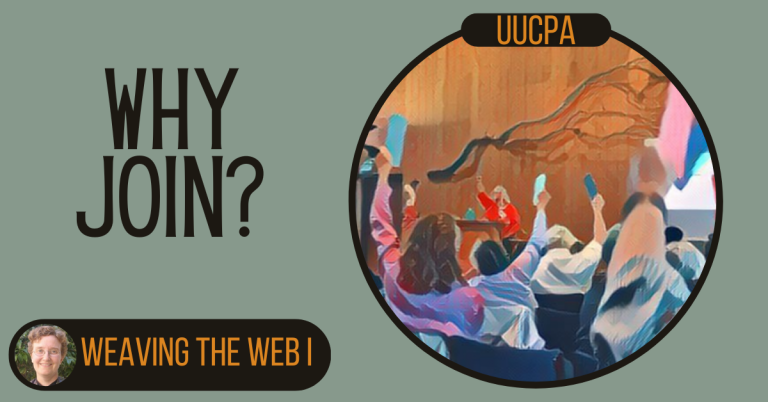What does it mean to be a member of UUCPA? What does it mean to belong?
In one sense–perhaps the most important one–simply being involved in the congregation is belonging. Sure, when you’re new to a congregation, as with any community, it usually takes a while to feel like you belong. At first, the names are mostly unknown, the faces are a blur, and the people don’t know you any more than you know them. But as you begin to be familiar with the congregation, and coming to services–
or going to Forum
or singing in the choir
or meditating on Saturday mornings
or attending a class
or talking on the patio
or participating in any one of the dozens of other groups and activities
–becomes a regular part of your life, then you feel like you belong, and others feel like you belong here too.
For lots of people, when they get to this point, they begin to think of themselves as members of UUCPA. They might tell others, “I belong to the Unitarian Universalist congregation on Charleston Road.” And for almost all purposes, they will be completely correct.
This kind of membership carries certain responsibilities, as well. Everyone who participates at UUCPA is expected to abide by our relational covenant, because it is what keeps the community healthy. Everyone who benefits from the programs, staff, buildings, and volunteer-led activities of the congregation is asked to contribute what money and time they can, because money and time are what make all these things possible. Everyone is responsible for doing their best to live the values we profess. These responsibilities fall on all of us, from occasional participant to full-fledged member.
However, the term “member” has a formal meaning in congregations like ours–not just Unitarian Universalist congregations, but those of other denominations as well, such as the United Church of Christ. It is rooted in our democratic processes. Since we make our most important decisions democratically, the question of who can vote is a serious matter. Members, in this crucial sense of voting member, decide on whether to call a minister, and whom to call as minister. Members decide on whether to buy or sell a building, or as we are currently doing, make major renovations. Members vote on the budget that allots the money we all contribute, and vote as well for the roster of justice partners that receive the special collection each month.
The decision to become a voting member rests with you. There is no test, no conversion process. Oh, we offer classes about Unitarian Universalism and newcomers’ gatherings, but the purpose of those, crucially, is not for the ministers or board or anyone already at UUCPA to decide whether you may become a member, but rather, for you to decide whether UUCPA is a community whose mission matches your own vision and intentions for your spiritual growth. When you decide that yes, it is, then you complete the simple process outlined here–
–the Board responds by affirming your membership, and voila!: you are a full-fledged member. After that, you can:
- vote in congregational meetings (30 days after your affirmation by the Board of Trustees)
- lead a committee
- serve on the Board, Committee on Ministry, Worship Associates, or Nominating Committee
- be a delegate to the General Assembly of the Unitarian Universalist Association and the Regional Assembly of the UUA’s Pacific Western Region.
You’ll also begin receiving the UU World, an enjoyable perk.
I bring this up now because in order for you to vote in the next congregational meeting, which is our annual meeting on April 21, you must be affirmed by the Board by mid-March. Exciting decisions are in process, and if you feel like UUCPA is your place, we want you to have a voice in them. So if you have been thinking about becoming a member, now’s a great time to act.
I hope you will. If UUCPA is your spiritual community, the place whose mission matches and supports your own, then I hope you’ll make it official and accept all of the privileges of membership along with its responsibilities.
Blessings,
Amy

